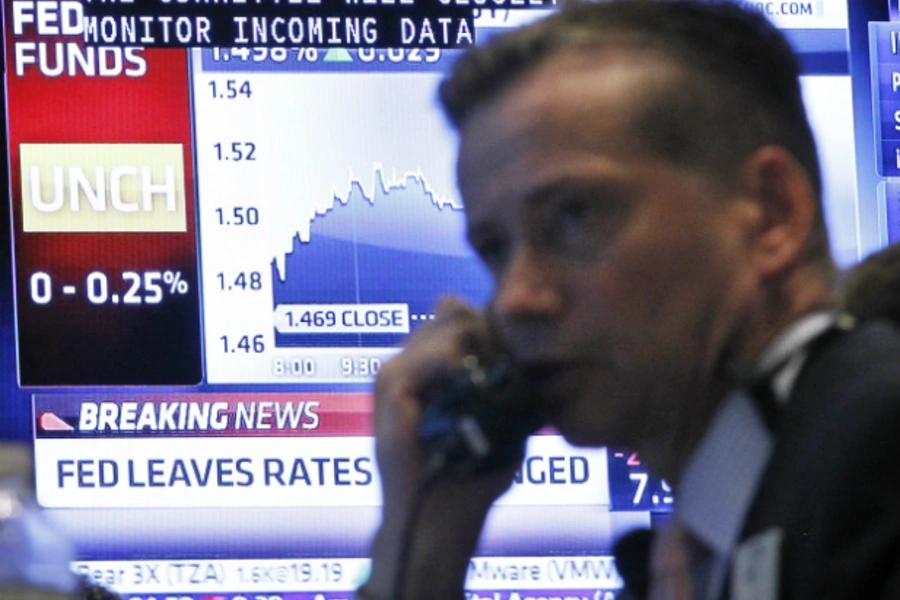Morning Brief: Why Do U.S. Treasury Rates Remain Low?

More on:
Despite the looming fiscal cliff, and mounting debt, the United States continues to enjoy low borrowing costs, perhaps because the rest of the world has great troubles (WSJ). Economist Kenneth Rogoff sees low global interest rates as a short term equilibrium resulting from the global savings glut, central bank intervention, and growing economic concerns driving investors into bonds that are seen as stable. While he says the current low rates could persist for some time, he says they could also unwind "remarkably quickly."
Jonathan Masters has written a pair of CFR Backgrounders that explain the depth of the fiscal pressure facing the United States in the “fiscal cliff” and the rising level of U.S. debt.
Debt and deficits. Read more from experts on the challenges in reducing U.S. debt.
Corporate Regulation and Taxation
New Mortgage Rules Proposed
The Consumer Financial Protection Bureau (CFPB) unveiled draft versions of new mortgage rules (NYT). The rules are open for public comment until October 9, and include measures requiring mortgage services to provide monthly statements, warn borrowers before an interest rate reset, and provide more options to prevent foreclosure. CFPB Director Richard Cordray said: "From processing payments to evaluating struggling homeowners and helping them avoid foreclosures, the bottom line is to treat consumers fairly by preventing surprises and runarounds."
The CFPB was created by the 2010 Dodd-Frank Act, one of the most significant regulatory reform measures since the Great Depression. This Backgrounder by Steven J. Markovich examines the financial oversight bill.
Corporate regulation and taxation. Read more from top economists and business experts on solutions for addressing corporate tax reform.
International Trade and Investment
When American Businesses Go Global
Gillian Tett of the Financial Times discusses the growing globalization of U.S. corporations. She observes that the growth of overseas revenue and operations lessens the dependence of firms on the conditions of the American economy. This growing disconnect may partially explain why few corporate chieftains take a leading role in advocating specific policies that may increase U.S. competitiveness.
This CFR Independent Task Force report encourages the Obama administration and Congress to adopt a “pro-America” trade policy that brings the benefits of global engagement to more Americans.
International trade and investment. Read more from leading analysts on the debate over next steps in U.S. trade policy.
Infrastructure
Bechtel to Begin Construction of LNG Export Terminal
Construction giant Bechtel will begin building the first U.S. LNG export terminal outside of Alaska (Reuters). Houston-based Cheniere Energy will operate the Sabine Pass LNG terminal, which is expected to come online in 2015. The new facility will be built on the site of a LNG import terminal that opened in 2008 but was never used, as surging domestic natural gas production forestalled demand for imported LNG.
The transformation of the U.S. energy market created by the new extraction techniques for oil and gas has some predicting a renaissance for U.S. manufacturing based on lower, stable energy costs. Renewing America contributor Steven J. Markovich examined those claims and argued that the impact will likely be modest in a Policy Initiative Spotlight.
Helium Reserve Could be Shutdown
The Federal Helium Reserve (FHR)--provider of over a third of the world's crude helium--is expected to end sales next year (WSJ). A 1996 law allows the sale of helium only to pay off the debt incurred to acquire the FHR; that debt should be extinguished in 2013. If the supply is cut off, research scientists, hospitals with MRI machines, welders, and balloon buyers may face a helium shortage. The FHR's low sales price--set not by market conditions but by its debt repayment plan--has removed the incentive for the private sector to develop new sources.
Infrastructure. Read more on how upgrading the nation’s aging network of roads, bridges, airports, railways, and water systems is essential to maintaining U.S. competitiveness.
The Morning Brief is compiled by Renewing America contributor Steven J. Markovich.
More on:
 Online Store
Online Store